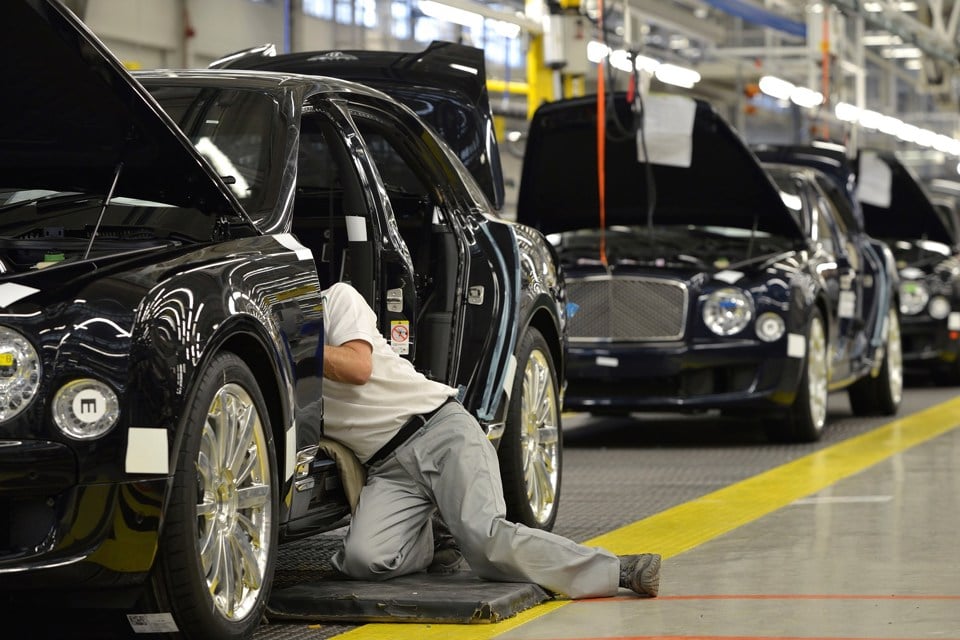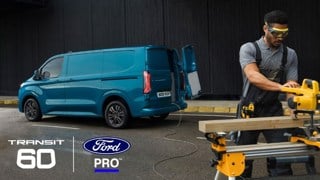If there’s no second wave of COVID-19, there is plenty of hope for a V-shaped economic recovery, the SMMT (Society of Motor Manufacturers & Traders) Summit was told last month.
Doubts remain over the depth of that recovery, but attendees of the virtual conference heard that car sales have been building quickly in countries that have come out of lockdown.
Talking through the company’s global sales, Christian Dahlheim (pictured), Volkswagen AG head of group sales, said China has almost returned to normal and in Europe, “hard hit” by the pandemic, sales are climbing to around 70-75% of typical levels.
If there’s no second wave of COVID-19, there is plenty of hope for a V-shaped economic recovery, the SMMT (Society of Motor Manufacturers & Traders) Summit was told last month.
Doubts remain over the depth of that recovery, but attendees of the virtual conference heard that car sales have been building quickly in countries that have come out of lockdown.
Talking through the company’s global sales, Christian Dahlheim (pictured), Volkswagen AG head of group sales, said China has almost returned to normal and in Europe, “hard hit” by the pandemic, sales are climbing to around 70-75% of typical levels.

Dahlheim said Volkswagen expects a V-shaped recovery, but, in Europe, the recovery will carry through 2021. “In essence, it’s a V-shaped recovery lasting until 2022,” he added.
This article first appeared in the August Issue of AM's digital magazine - read it free here.
There are encouraging signs of demand as, once lockdown lifts, sales have been climbing to close to those of the previous year. He warned, however, there will be a long-term impact from the financial support governments have provided to safeguard industries and jobs.
The pandemic has sparked a worldwide recession. Chris Giles, economics editor of the Financial Times, said the outlook is an “enormous” 6% contraction of the world economy. Recovery won’t be helped by the tensions between the US and China and international taxation challenges and, even though countries have domestic recovery policies in place, there is not the global level of cooperation there was in 2008-2009.
The data shows that as domestic economies reopen there is a V-shape recovery generally, he said, but not fully. It will “fall short”, he said, pointing to the OECD forecast for the end of 2021 which expects the economic output of the advanced economies to still be 5% below November 2019 – a bigger gap than the 2008 financial crisis – due to the new ways the world will have to do business until a vaccine is available.
The UK’s economic output was down 25% in April at the peak of the coronavirus crisis. But, since opening in June, shops say consumer spending has come back rather quickly, he said.
After the measures implemented then, the UK Government is now moving into a second phase of support, with some assistance likely in specific sectors such as hospitality and travel. Giles warned a scrappage scheme for cars is unlikely as Whitehall suspects it would benefit overseas manufacturers and economies – as 90% of UK new cars sold are imported.
By the end of this year there will be consolidation as “the reckoning” of this crisis, he said. “There is going to be quite a bounce back in the months ahead, and in the future we’ll need to face the facts, honestly, that there’s been a lot of damage done by this crisis, and there will be a difficult path ahead,” he added.
Brexit still needs to be settled and Giles said he’s optimistic about the UK and European Union achieving a trade deal, because it’s what both sides desire. That doesn’t mean it will be a great deal for the UK, it might be a compromise, he said.
Adrian Hallmark, chairman and CEO of Bentley Motors, said this is the third crisis for the UK’s automotive industry in less than three years: WLTP caught the industry unprepared, then came hard Brexit preparations, and, lately, COVID-19.
Hallmark praised the Government’s actions to support business through the lockdown, but added he’d like “the same kind of open dialogue” between the UK Government and the auto industry to examine how to get to ‘net zero’ carbon emissions. He believes longer range plug-in hybrids are part of the solution, not just pure electric vehicles (EVs).
Graham Hoare OBE, chairman of Ford of Britain, said reaching zero tailpipe emissions in the UK by 2035 is “a challenge we all need to rise to” but it “needs a clear and consistent pathway to bring change”. Hoare said the industry and government must learn lessons from overseas, such as Norway which has spent 30 years building confidence in consumers. Today pure EVs are 70% of its market. “It’s that consistency that’s so essential,” he said.
Hoare said that means a broad range of incentives, at point of sale and during use of the vehicle, for the long term. Government could set goals in the short term that build the long-term outcome it desires, he said.
Dahlheim said the lockdowns will bring a faster transformation in digitalisation and sustainable mobility. Cleaner air, particularly in the world’s largest cities, has raised awareness of sustainable mobility, he said. Governments want it and half of consumers are willing to drive an electric car, but the biggest hurdle is infrastructure. Once that problem is solved the transition from ICE (internal combustion engine) to EV will accelerate, he said.
Glenn Schmidt, vice president of governmental and external affairs at BMW Group, also cited the example of Norway, which has implemented tax and purchase advantages and thorough charging infrastructure to make the share of EVs “skyrocket”. In Germany state incentives of €9,000 (£8,2000) have brought a compact EV down to price parity with combustion engine cars.
However he warned that there are countries where those incentives are reduced and the EV share drops. And there are still “psychological” challenges for many consumers to overcome, he said, so education and infrastructure remain vital.
Quote Unquote - SMMT Summit soundbites
 NADHIM ZAHAWI MP, MINISTER FOR BUSINESS AND INDUSTRY (pictured)
NADHIM ZAHAWI MP, MINISTER FOR BUSINESS AND INDUSTRY (pictured)
“The UK is a significant importer of vehicles and avoiding tariffs should be absolutely beneficial to both sides (the UK and EU) given our shared commitment to high regulatory standards.
“We are continuing to consult on our manifesto commitment to bring forward the end of the sale of petrol and diesel cars and vans from 2040 to 2035 or earlier if a faster transition is feasible. As part of this consultation, we are asking what accompanying package of support will need to be in place to enable the transition and to minimise the impact on businesses and consumers.”
GRAHAM HOARE OBE, EXECUTIVE DIRECTOR, BUSINESS TRANSFORMATION, FORD OF BRITAIN
“We need to take our customers on a journey in parallel to building the infrastructure that makes those products usable in the hands of the consumer.
“We’ve about £11 billion of expenditure over the next few years on electrification and we need to spread that money wisely over the broadest range of products and with our partners.”
CHRISTIAN DAHLHEIM, HEAD OF GROUP SALES, VOLKSWAGEN
“There needs to be some level of caution. All governments have saved a lot of the industry, but if you get a guaranteed credit that helps you for a certain time, at the end of the day you still have to pay back the amount you’ve borrowed. So we do expect an economic impact that lasts longer than the next few months.”
 MICHAEL GRANOFF, FOUNDER AND MANAGING PARTNER, MANIV MOBILITY (pictured)
MICHAEL GRANOFF, FOUNDER AND MANAGING PARTNER, MANIV MOBILITY (pictured)
“We should not make too many assumptions for the long term out of what happens over the coming months…some changes will last from this period, but they’re probably overstated right now.”
ANDREAS ZACHARIAH, CHIEF EXECUTIVE AND FOUNDER, TRAVELAI
“Until the automotive sector better recognises that the car is just one of many mobility options a person has to get from A to B it will be at risk of being disrupted…. the autonomous vehicle (AV) is still unproven ground. The reality of when can AV step in to resolve the situation we have is not 2021 and probably not even 2022.”
PETER STEPHENS, HEAD OF UK EXTERNAL AND GOVERNMENT AFFAIRS, NISSAN MOTOR GB
“The growth in last-mile delivery we’ve seen as a result of the lockdown offers a real growth opportunity as 100% electric vans are a great option for this….there is a real opportunity coming out of COVID-19 to push the agenda around net zero.”
ADRIAN HALLMARK, CHAIRMAN AND CHIEF EXECUTIVE, BENTLEY MOTORS
“We need the right technologies in place and not just BEVs (battery electric vehicles), because for some people, and some product categories, a pure electric vehicle in the next 10 to 15 years will not meet their needs.”
GLENN SCHMIDT, VICE PRESIDENT OF GOVERNMENT AND EXTERNAL AFFAIRS, BMW GROUP
“For the next 10 years our prognosis is that half of our new vehicle sales will be electrified and with a plug.”
IAN PLUMMER, COMMERCIAL DIRECTOR, AUTO TRADER
“Although our latest research shows 77% of consumers are considering a ULEV for their next car, we’re a way off being able to claim that electric is the new normal from the consumer point of view.”
Login to continue reading
Or register with AM-online to keep up to date with the latest UK automotive retail industry news and insight.






















Login to comment
Comments
No comments have been made yet.